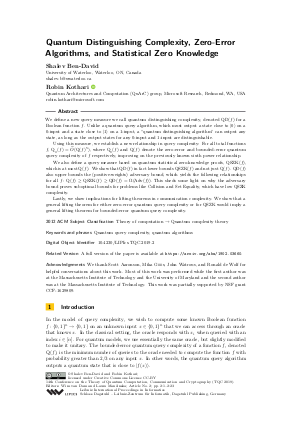@InProceedings{bendavid_et_al:LIPIcs.TQC.2019.2,
author = {Ben-David, Shalev and Kothari, Robin},
title = {{Quantum Distinguishing Complexity, Zero-Error Algorithms, and Statistical Zero Knowledge}},
booktitle = {14th Conference on the Theory of Quantum Computation, Communication and Cryptography (TQC 2019)},
pages = {2:1--2:23},
series = {Leibniz International Proceedings in Informatics (LIPIcs)},
ISBN = {978-3-95977-112-2},
ISSN = {1868-8969},
year = {2019},
volume = {135},
editor = {van Dam, Wim and Man\v{c}inska, Laura},
publisher = {Schloss Dagstuhl -- Leibniz-Zentrum f{\"u}r Informatik},
address = {Dagstuhl, Germany},
URL = {https://drops-dev.dagstuhl.de/entities/document/10.4230/LIPIcs.TQC.2019.2},
URN = {urn:nbn:de:0030-drops-103944},
doi = {10.4230/LIPIcs.TQC.2019.2},
annote = {Keywords: Quantum query complexity, quantum algorithms}
}

 Creative Commons Attribution 3.0 Unported license
Creative Commons Attribution 3.0 Unported license

